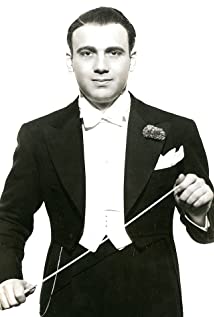Johnny Green (I)
Composer-pianist-arranger Johnny Green was born in Far Rockaway, New York. The son of musical parents, Green was accepted by Harvard at the age of 15, and entered the University in 1924. Between semesters, bandleader Guy Lombardo heard his Harvard Gold Coast Orchestra and hired him to create dance arrangements for his nationally famous orchestra. He gained a thorough education in music, history, economics, and government before returning to pursue a master's degree in the field of English literature. His father interrupted Johnny's education and forced him to become a stockbroker, and with great unhappiness, Johnny tried it for six months. His young bride Carol (to whom he dedicated Out of Nowhere) encouraged him to leave Wall Street and cultivate his many musical talents. She remarked, "We didn't have children, we had songs" (indeed, it was during his first marriage that most of his hit standards were composed, including "I Cover the Waterfront," You're Mine, You," "Easy Come, Easy Go," "Rain Rain Go Away" and "I Wanna Be Loved."). During the lean years, he arranged for dance orchestras, most notably Jean Goldkette on NBC. He was accompanist/arranger to stars such as James Melton, Libby Holman and Ethel Merman. It was while writing material for Gertrude Lawrence that he composed Body and Soul, the first recording of which was made by Jack Hylton and His Orchestra, eleven days before the song was copyrighted. 'Nathaniel Shilkret' and Paul Whiteman commissioned him to write larger works for orchestra, and he scored numerous films at Paramount's Astoria Studios. He conducted in East Coast theatres and toured vaudeville as musical director for Buddy Rogers. During his two-and-a-half years at Paramount Studios, he was able to learn more about arranging from veterans Adolph Deutsch and Frank Tours. In 1934, he returned from London, where he had composed a musical comedy for Jack Buchanan. At the age of 25, he had several hit songs under his belt. William Paley, the president of the Columbia Broadcasting System and an investor in New York's St. Regis Hotel, encouraged John W. Green to form what became known as Johnny Green, His Piano and Orchestra. (Green added, "My arm didn't need much twisting.") His orchestra made dance records for the Columbia and Brunswick companies, in a depressed era when record sales were inconsequential to a song's popularity. In 1935, Green starred on the Socony Sketchbook, sponsored by Socony-Vacuum Oil Co. He lured the young California songstress Virginia Verrill to headline with him on the Friday evening broadcasts. His "regular" cast of vocalists included former débutante Marjory Logan, Jimmy Farrell, and the four Eton Boys, all of whom appeared in films and on stage. Green's piano playing is intricate, and his musical ideas are exceedingly clever. Green was at the top of his field in New York, and he continued conducting on radio and in theatres into the 1940s, until he decided to move to Hollywood and make his mark in the film business. His credits as musical executive, arranger, conductor and composer are lengthy, but include such highlights as El árbol de la vida (1957), Escuela de sirenas (1944), Penas al viento (1947), Intermezzo lírico (1948) (Academy Award), Valle alegre (1950), Sinfonía de París (1951) (Academy Award), Boda real (1951), High Society (1956) and Amor sin barreras (1961) (Academy Award). Married three times, he had a daughter with actress Betty Furness and two daughters with MGM "Glamazon" Bunny Waters. He was a respected board member of ASCAP and guest conductor with symphonies around the globe, including the Hollywood Bowl, Denver Symphony, the Philadelphia Orchestra, Los Angeles Philharmonic and more. He was a chairman of the music branch of the Academy of Motion Picture Arts & Sciences and a producer of television specials.

